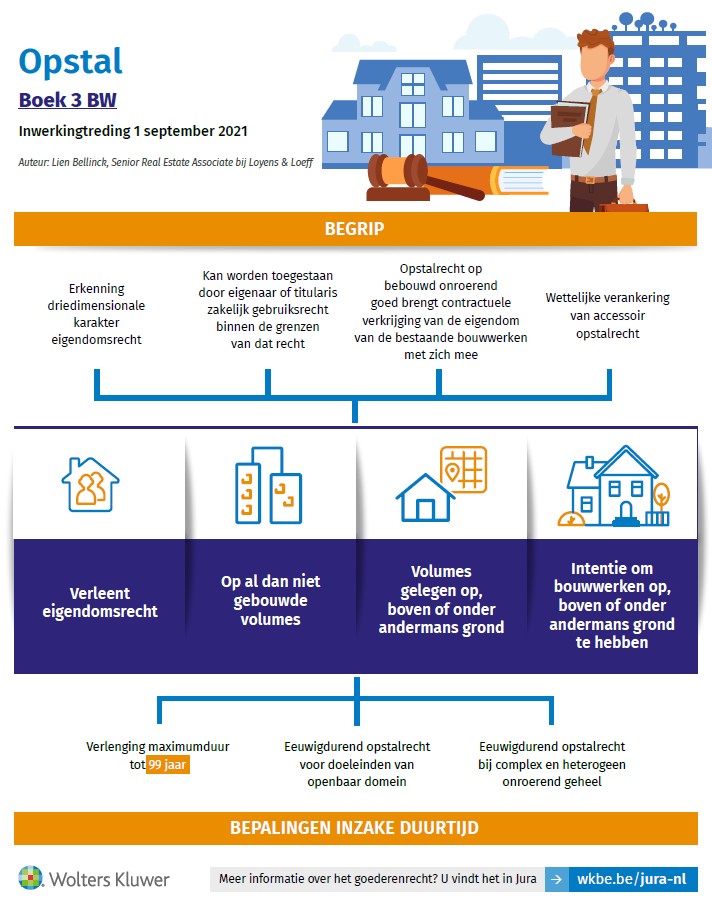The right to build is now defined as a temporary right of ownership on the volumes located on, above or under someone’s land.
Download the presentation in French and Dutch. You will also find below an infographic (in Dutch) explaining the changes to the building right as well as the recordings in French and Dutch of our webinar on the subject.
The new Book 3 defines the right to build as a right of use giving a temporary right of ownership on the volumes, whether built or not, located on, above or under another person's land, with a view to have or build constructions within that volume. During the term of its right, the holder of the right to build is the owner of these constructions.
Consequently, building rights are henceforth expressed in terms of "right of ownership of volumes". By doing so, the legislator emphasizes that building rights are rights in rem allowing horizontal property divisions. Contrary to long-term lease rights and usufruct rights, building rights are not primarily intended to grant a right of use and enjoyment, but aim to separate the ownership of the land from the ownership of the volumes located on, above or under the land. It is therefore a splitting of ownership.
Building rights can be established on both unbuilt and built-up volumes. But what is the applicable property law regime in case a building right is established on a built-up volume? The new Book 3 answers this question by stating that the holder of the building right on a built-up volume must be considered as the temporary owner of the constructions located within that volume, which assumes a transfer of ownership of these constructions.
Just as it is today, the split ownership resulting from the establishment of a building right is temporary. Its maximum duration is however increased from 50 to 99 years. This maximum duration of 99 years is mandatory. mandatory. There are however two exceptions. A perpetual building right is possible
- if it is established by the land owner for public domain purposes; and
- when it concerns (i) a complex and heterogeneous immovable unity, (ii) consisting at least of two volumes, (iii) without shared common parts and (iv) where each volume is autonomous and used independently for a different purpose.
The holder of a building right can transfer or mortgage his building right. He can also transfer or mortgage the constructions temporarily owned by him together with his building right.
Since the holder of a building right is the temporary owner of the volume covered by the building right, he may have constructions or build them within that volume. As owner, the holder of the building right may sell, rent out, keep, remove,… these constructions, unless otherwise agreed. If the holder of the building right was however obliged to build certain constructions, he is not entitled to remove them.
With regard to maintenance and repair, the new Book 3 provides that the holder and the grantor of the building right must each carry out the maintenance repairs and major repairs that they are legally (within the volume they each own) or contractually bound to do. With regard to the payment of taxes during the term of the building right, the new Book 3 provides that the holder of the building right and the grantor must each pay the taxes related to the constructions owned by them.
At the end of the building right, accession will take place and the grantor of the building right will become the owner of the constructions located within the volume that was covered by the building right.
Pursuant to the new Book 3, the grantor of the building right must pay a compensation for the constructions. This compensation must be calculated on the grounds of unjust enrichment (i.e. ongerechtvaardigde verrijking / l'enrichissement injustifié). According to the theory of unjust enrichment, this means that, in principle, the holder of the building right is entitled to a compensation equal to the amount by which the grantor of the building right has been enriched. However, this compensation may not exceed the amount by which the holder of the building right has been impoverished. Consequently, the compensation must be equal to the lowest amount between enrichment and impoverishment. This rule is, however, not mandatory. The parties may deviate from it and, for example, stipulate that no compensation shall be due or that the compensation shall be equal to a fixed amount, or be calculated on the basis of a certain – clear – formula. Until payment of the compensation, the holder of the building right has a right of retention on the constructions.
Facts:
Situation 1: a project developer is granted a building right on a plot of land on which a building is located that must be demolished before it can be redeveloped.
Situation 2: a project developer is granted a building right on a plot of land, on which a building is located. As part of the redevelopment, only the façade will be retained.
Analysis:
In both situations, the project developer acquires a building right on a built-up volume. As a result, he becomes the temporary owner of the existing building in the volume.
Since the project developer becomes the temporary owner of the existing building, there is a transfer of ownership of an immovable property subject to transfer tax (10% in Flanders or 12.50% in Brussels and Wallonia). The basis on which the registration duties are calculated is the higher of (i) the agreed value or (ii) the market value. In practice, parties often agree that a building to be demolished has no value. Consequently, it should be determined what is the market value of such building, which is not an easy task.
If the intention is to demolish the entire building (situation 1), we believe that the market value is 0. If only the façade of the building is retained (situation 2), we believe the market value is not 0 but very limited.
In addition transfer taxes due for the transfer of ownership of the existing building, 2% registration fees are due for the establishment of the building right. In this context, it is important to note that if the building right agreement provides that the holder of the building right has the obligation to demolish the existing building, this qualifies as a charge and the demolition costs have to be included in the calculation of the 2% registration duties. On the other hand, it gives good argument for a valuation at 0 for transfer tax purposes.
Facts:
A company that owns a plot of land on which a warehouse is located, grants a building right to a project developer with the obligation to build a second warehouse next to the existing one. The intention is that the holder of the building right builds a new warehouse and then sells it, together with his building right, to the company-land owner.
Analysis:
Since the building right is established on (the volume located above) a part of a plot of land, parties must proceed with pre-cadastration prior to the establishment of the building right.
Regarding the duration of the building right and the (amount of the) building right fees, the parties are free to determine this themselves. In practice, we often see that building rights are granted for a period longer than the period required for the construction of the building (in this case: the warehouse). Note that if the building right agreement provides that the project developer has the obligation to build a new warehouse, this qualifies as a charge subject to 2% registration duties.
If the project developer has built the warehouse in accordance with the provisions of the building right agreement, he shall subsequently sell it, together with his building right, to the company-landowner. This sale should be subject to VAT, either based on the status of the developer or by option, since it concerns a new building.
However, if the project developer does not (continue to) build the warehouse during the construction phase, the company-landowner is entitled to terminate the building right for breach of contract. A sufficiently serious breach of contract is required to justify such a termination.
It should be noted that termination for breach of contract is an abnormal ground for termination which only has relative effect (see our last article on this topic). As a result, termination of the building right is not enforceable against bona fide third parties who have a competing right, e.g. the bank that has granted financing to the project developer and obtained a mortgage in return. Since, in practice, the fact that the project developer does not (continue to) build the warehouse is often due to the fact that he no longer has the funds to finance the project, he will probably also not have the means to repay the bank. In that case the bank may proceed to enforce his mortgage. This is not a favourable situation for the company-landowner as it. To avoid this, we recommend stipulating in the building right agreement whether or not the project developer may allow a mortgage on his building right. In addition, prior to the establishment of the building right, parties could conclude a tripartite agreement with the bank to regulate this type of situations. Finally, instead of having to seek for termination, parties may agree to include a condition subsequent according to which the building right shall terminate by law at a certain point in time based on the non-occurrence of a specific event (e.g. provisional acceptance of the construction). Such condition subsequent is enforceable towards third parties.
The new provisions on building rights are important in the context of real estate developments. Parties should draft their building right agreements properly and also regulate the situation of the developer who does not finish (on time) the buildings he was going to erect within the framework of the building right agreement. When drafting the building right agreement, the tax consequences must always be kept in mind.








